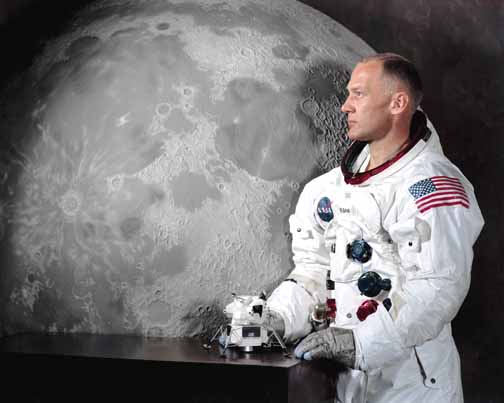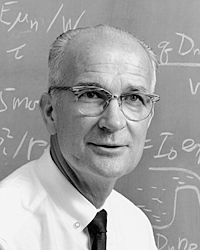July 20, 1969—a day that would go down in history, as the first humans went on to set foot on the Moon. With an estimated 530 million people worldwide watching at the time, today’s generation can recall their parents or grandparents describe the chills they felt as Neil Armstrong spoke his famous words.1 People today tend to forget that there was a second man to touch down some fifteen minutes after Armstrong: Edwin “Buzz” Aldrin, a man sometimes forgotten simply because he was not the first man on the Moon, on a mission that could have been quite capably another NASA tragedy.
The Apollo 11 Mission consisted of a crew of three men; Apollo 11 Commander Neil Armstrong, Command Module Pilot Michael Collins, and Lunar Module Pilot Edwin “Buzz” Armstrong.2 On July 16, 1969, the crew prepared to launch from Cape Kennedy in Florida. Aldrin described what he saw, as his colleagues were being strapped into the rocket. He took in the moment and the magnitude of the journey the crew was about to embark on:

“As far as I could see there were people and cars lining the beaches and highways. The surf was just beginning to rise out of an azure-blue ocean. I could see the massiveness of the Saturn V rocket below and the magnificent precision of Apollo above. I savored the wait and marked the minutes in my mind as something I would always want to remember.”3
At 9:32 a.m. on July 16, 1969, the Saturn V Rocket ignited, launching the crew of Apollo 11 towards the Moon some 238,900 miles away. Aldrin poetically describes his view of Earth from space, “The thought reoccurred that wars are generally fought for territory or are disputes over borders; from space the arbitrary borders established on Earth cannot be seen.”4
On July 20, with the ever growing Moon in sight, the Lunar Module detached from the Command Module. From here on out, Aldrin was the pilot. It was his turn to etch his name in the history of humankind.
While advancing toward the Moon’s surface, the dreaded yellow caution light came on. Being so far away from Earth, yet so close to the surface of the Moon, the astronauts’ only hope was that the malfunction wasn’t critical. “Hearts shot up into throats while we waited to learn what would happen.”5 The crew received another caution warning before being told by their flight commander back in Houston to proceed. Following the first two warnings, Aldrin and Armstrong went on to receive at least three more warnings before being reassured, once again, that the mission was still a go.
July 20, 1969 at 4:17 p.m. — Edwin “Buzz” Aldrin successfully lands Lunar Module Eagle on the surface of the Moon in Mare Tranquillitatis (The Sea of Tranquility). Command Center has been painfully waiting four long days to hear Aldrin radio the words of success: “Houston, Tranquility Base here. The Eagle has landed.”6

Edwin “Buzz” Aldrin became the second man to set a pair of footprints on the surface of the Moon some fifteen minutes after his Command Leader Neil Armstrong initially touched down. When asked about the Moon’s scenery, Aldrin described it as “Beautiful, beautiful. Magnificent Desolation.”7 The crew spent the following hours taking samples from the Moon, taking photos, and of course, planting the American Flag on the Moon’s surface.
Twenty-one hours after landing, it was time to head back to Earth. The Eagle would meet back up with the Command Module Columbia and its pilot Michael Collins in the Moon’s orbit. The crew shared a brief celebratory moment before preparing their return voyage—back towards Earth’s orbit. The crew would return to Earth eight days after launch, landing in the Pacific Ocean on July 24, 1969.8 In a stunning display of American science Buzz Armstrong, along with the rest of the Apollo 11 crew, ultimately ended the Space Race—heeding President John F Kennedy’s 1961 call to put American men on the Moon and safely return them before the decade’s end.

“And, therefore, as we set sail we ask God’s blessing on the most hazardous and dangerous and greatest adventure on which man has ever embarked.” — John F. Kennedy, September 12, 1962
- Sarah Loff, “Apollo 11 Mission Overview,” NASA, April 17, 2015. http://www.nasa.gov/mission_pages/apollo/missions/apollo11.html. ↵
- Lawrence W. Baker, Sarah Hermsen, Rob Nagel, Peggi Saari, Space Exploration Reference Library (Detriot; UXL, 2008), 178. ↵
- Edgar M. Cortright, Apollo Expeditions to the Moon: The NASA History (Courier Corporation, 2012), 204. ↵
- Edgar M. Cortright, Apollo Expeditions to the Moon: The NASA History (Courier Corporation, 2012), 206. ↵
- Edgar M. Cortright, Apollo Expeditions to the Moon: The NASA History (Courier Corporation, 2012), 212. ↵
- NASA Content Administrator, “July 20, 1969: One Giant Leap For Mankind.” NASA, February 19, 2015, http://www.nasa.gov/mission_pages/apollo/apollo11.html. ↵
- Buzz Aldrin and Wayne Warga, Return to Earth (Open Road Media, 2015), ebook. ↵
- Buzz Aldrin and Wayne Warga, Return to Earth (Open Road Media, 2015), ebook. ↵



97 comments
Alexandra Lopez
Congratulations on your nomination. I really enjoyed this article, it was informative and descriptive of what happened on July 20, 1969. I did not realize who was the second person to walk on the moon until I read this article. The author did an excellent job in explaining why not only was Neil Armstrong important but without Buzz Aldrin it could have not happened. Great job and great read. (reposted)
Alexandra Lopez
Congratulations on your nomination. I really enjoyed this article, it was informative and descriptive of what happened on July 20, 1969. I did not realize who was the second person to walk on the moon until I read this article. The author did an excellent job in explaining why not only was Neil Armstrong important but without Buzz Aldrin it could have not happened. Great job and great read.
Natalie Juarez
I learned about a man who made played a huge part in history and landed on the moon. Neil Armstrong is as much knowledge that I had before reading this article when it came to the moon landing, so I am glad I got to learn about Edwin Aldrin who played just as an important role to U.S. history. Congrats on your nomination for it Is well deserved!
Robert Ruiz
Congratulations on your nomination! This was a well informative article. I honestly did not know who was the second man on the moon. Its funny that everyone knows Neil Armstrong, but forget about the people he was with. I thought this article was very organized and was just simple enough to make a powerful informative article. Overall, this was again a well deserved nomination and really enjoyed reading your article.
Ximena Mondragon
Congratulations on your nomination, overall, this article is well written and informative. It also keeps the reader engaged and it flows very nicely. I really like that this article names a character that is very common to readers: “Buzz”. Also , the title is very intriguing because the reader wants to know what is the “second” leap for mankind and how it is different from the first.
Gabriela Murillo Diaz
I really liked your article! This is something I wouldn’t have known if it weren’t from reading this. Aldrin was a very valuable part of NASA because of his mission. Our race to the moon is a very important part of our history and Aldrin took place that. He deserves to be written about and remembered. We place all of our attention on Armstrong, but for him to get where he did, he could not have done it without Aldrin.
Irene Astran
This article brought me back to my middle school days when our instructor begged the question why? Why was Armstrong chosen to step out of the capsule first? I would have liked to see the answer to this question in the article. However, I understand that this information may not have been released or explained to the public. I imagine the excitement of the achievement left this question long in the dark.
Natalie Thamm
Congratulations on your nomination, you deserve it! This is a really well done article on a man that played a paramount role in the success of the moon landing. Without Buzz Aldrin, Neil Armstrong might not have had the opportunity to be the first man on the moon, so his role in the moon landing should be just as known.
Robert Rees
I’m glad to see and article that focuses more on Buzz than on Neil. Just because his foot hit the ground first he gets to be the more popular of the pair. Not to say that Buzz isn’t popular but he deserves as much recognition as Neil. Anyway, mini rant aside this is a fantastic article that is very informative and well detailed. Good luck at the award ceremony!
Max Lerma
Congratulations on being nominated! I think it is important for the world to remember how crucial Aldrin was on this mission as the pilot and as one of the men who set foot on a celestial body that was not our own planet. I believe that this article captured his importance and stands as a testament to his oft forgotten legacy. Armstrong, Aldrin, and Collins were amazing pioneers that should be held on the same standard as Lewis and Clark. They were our ambassadors to the heavens and your article does a great job in showing us their importance.